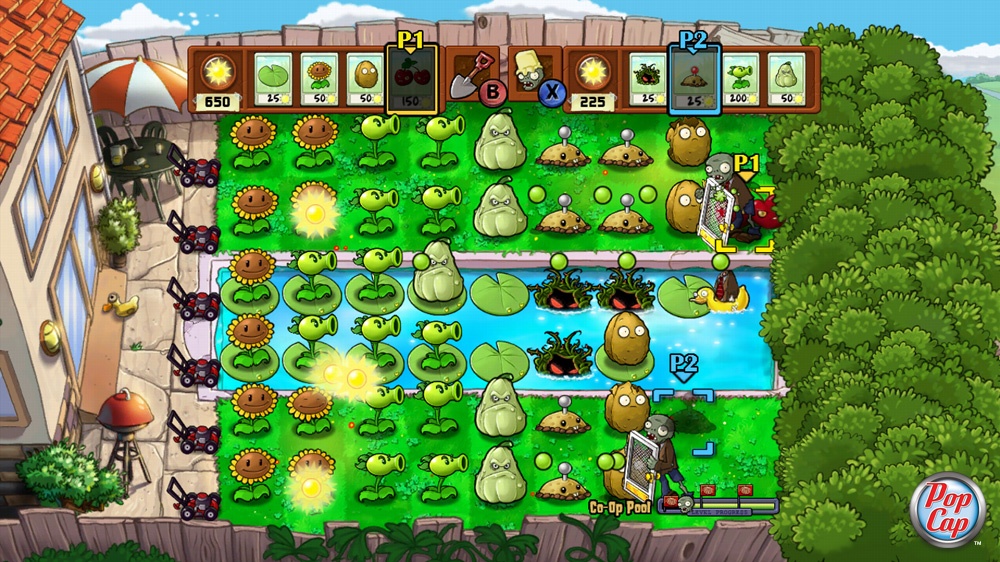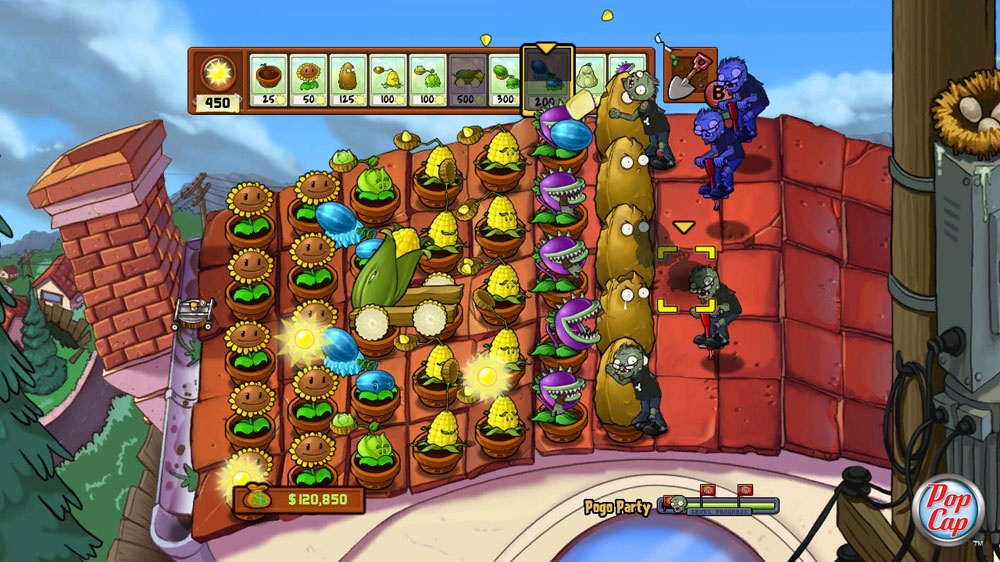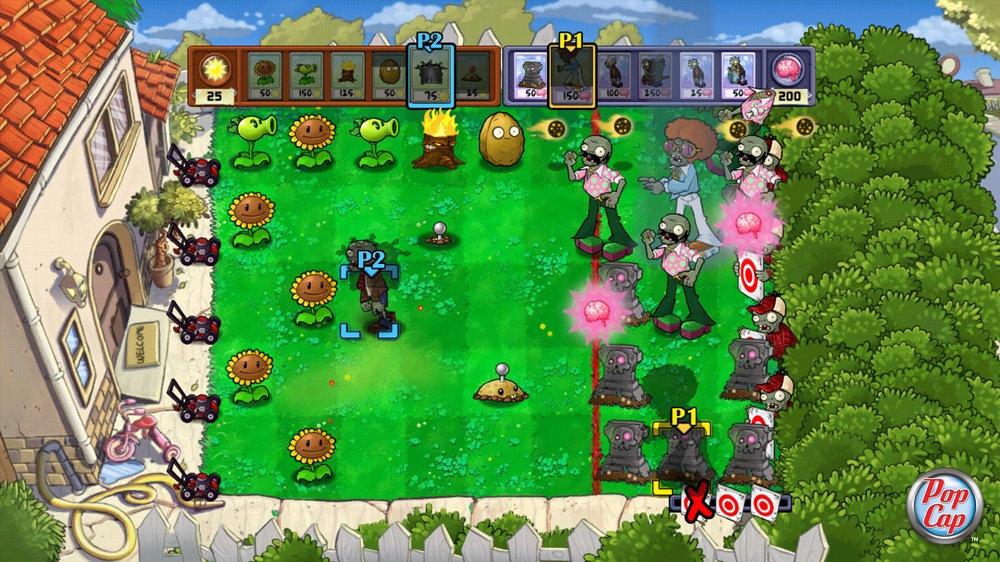You're trapped inside the house; brain-craving zombies are closing in from all sides; and there are no firearms or weaponized power tools in sight. What do you do? In Plants vs. Zombies, now available for the Xbox 360 a little over a year after it debuted on the PC, you have only one option: to strategically surround your home with a selection of combat-ready plants. Both the plants at your disposal and the zombies you're disposing of in this tower defense game come in a wonderful variety of shapes and sizes, and are introduced gradually as you play through the occasionally challenging campaign. The Xbox 360 version of Plants vs. Zombies boasts the same campaign, minigames, and bonus features found in the PC original and also adds some great new two-player options to the mix, making this the most feature-packed version of the game yet.

Most of your time in Plants vs. Zombies is spent either on your front lawn or out back, where there's a slightly larger garden with a pond running down the middle of it. Both are divided into grids, and each square can accommodate any one plant of your choosing. Zombies shamble, sprint, and swim from right to left toward your house, while you establish defenses that can include any of almost 50 different plants (though no more than 10 different species in any one level). Sunflowers are used to collect the sun that serves as currency, wall-nuts obstruct zombies for as long as it takes for them to be chewed through, potato mines explode when zombies step on them, peashooters do exactly what you think they do, and so on. As your arsenal increases in size, you have to choose which types of plants you're going to take into each level. You'll inevitably have favorites, but these decisions are also based on a sneak peek that you get of the zombies that are going to attack. If you see that some of the zombies are going to be attacking by floating over your garden suspended from balloons, for example, you need to make sure that you have a plant that can either puncture or blow away those balloons. Though most levels have you doing much the same thing, the ever-changing zombie horde and the different plants that you use to combat them--as well as levels set at night and in fog--prevent the action from getting repetitive.
Also keeping the action fresh are levels that take the form of different minigames. For example, there are levels in which you use wall-nuts as bowling balls, and other levels in which the plants in your arsenal are dealt to you randomly like playing cards. All of the minigames that pop up during the campaign can also be played outside of it, via a menu that lists no fewer than 20 different minigame types. You can do battle against invisible zombies, you can play a Bejeweled variant with the plants in your garden as zombies attack, and you can even raise your own undead in a zombiquarium. Even if you're only playing solo, Plants vs. Zombies is a game that just keeps on giving long after you've beaten the campaign. Add a second player, and this great game gets even better.

It's unfortunate that Plants vs. Zombies' multiplayer options aren't playable online, but both the cooperative and competitive games are fun to check out with a friend. Cooperative play is available in all of the dozens of campaign levels as well as in similar levels accessible via a co-op menu. In co-op, you and a friend must work together to defend the house from zombies in exactly the same way that you do in solo play. The twist is that you have completely different selections of plants at your disposal, so, for example, you might be the only one who can plant the sunflowers needed at the start of any level. There's no shared pool for the sun resource in co-op, which means you need to work closely with your friend to make sure that you both have the sun that you need to build plants and defend against the unrelenting zombie horde. Oddly, you have the ability to manually apply large lumps of movement-hindering butter to zombies' heads in co-op, which adds little to the game other than something for you to do when you're all out of sun. Competitive play is far more exciting than co-op because, for the first time in a Plants vs. Zombies game, one of you gets to play as the zombies in a meaningful way.
If you're playing as the plants, the only real difference between competitive and solo play is that you have to concern yourself with attacking stationary zombies on the far right of the screen while defending the house. If you're the zombie player, you have to defend those stationary zombies while deciding which of your undead minions to send on the offensive. You use tombstones in place of sunflowers, your resource is brains rather than sun, you have only three columns of the garden to play with, and your minions are mobile rather than rooted, but these obvious differences aside, playing as the zombies isn't wholly unlike playing as the plants. There are 18 different zombie types to choose from, though you go into each match with an arsenal of only five. If you choose the quick-play versus option, both players have access to only basic minion types, but if you randomize the loadouts or opt for a custom game that lets you pick which types you want, you have the option to include some really formidable frontal-lobe munchers. Digger zombies mine their way under the garden and then attack plants from the rear, catapult zombies drive vehicles equipped with long-range weaponry, and trash-can zombies are slow moving but heavily armored, to name but a few.

In addition to the all-new multiplayer options, one of the big differences between the Xbox 360 version of Plants vs. Zombies and those that have come before it is that you play it with a controller rather than with a mouse or a touch screen. If you've played previous versions, you're probably wondering how the controls translate, and the answer is very well. As the undead encroach from the right-hand side of the screen, you move your cursor around the garden with the analog stick and use the A button to place whichever plant you've used the left and right bumpers to select from your horticultural arsenal. The shovel you use to dig up plants when you want to replace them with better ones is mapped to the B button, which makes the act of replacing one plant with another even quicker and easier to perform than in other versions. Some of the minigames require different controls, but those aside, you already know everything that you need to. Furthermore, collecting the all-important sun resource is made effortless by the fact that it gravitates toward your cursor anytime you get close to it, which is a great addition given the relative lack of precision afforded you by an analog stick.
Plants vs. Zombies impresses across the board with ingenious game design, uncomplicated controls, colorful visuals, upbeat audio, a decent difficulty curve, and frequent player rewards. If you've never played Plants vs. Zombies before, it's time for you to spend 1200 Microsoft points ($15) and find out what you've been missing out on. And even if you've already devoted numerous hours to garden defense on other platforms, you should seriously consider doing it all again just to get your hands on the new Versus mode.